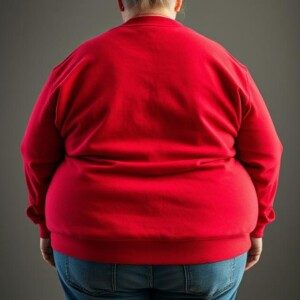
A morbidly obese COVID survivor has accused frontline heroes of fat shaming when she was in the ER and then COVID unit.
Influencer Amanda Martinez Beck spent 40 days in the hospital, including two weeks on a ventilator — due to the novel coronavirus.
Not long after being discharged, she was interviewed for a Medium.com article pertaining to alleged suboptimal hospital care that obese patients have been receiving during the pandemic.
Prior to testing positive, Beck was sometimes using a Rollator: a wheeled walker to help with her walking.
This information is on her Instagram account, where (at the time of this posting) she has over 17,000 followers.
One day she began feeling short of breath, and soon was in the ER, knowing already that she had tested positive.
She had brought the Rollator with her for more convenient seating. As a result, hospital staff immediately knew that she was at risk for falling without the device.
It’s not unheard of for obese patients, in a variety of medical settings, to feel slighted by questions or statements by nurses and doctors.
Sometimes, the recommendation of “You need to lose weight” is perceived as fat shaming.
But one must wonder just how authentic this alleged fat shaming in hospitals really is.
Is it more of a perception, or are obese patients truly treated more poorly than smaller patients?
I’ve taken my elderly parents to the ER dozens of times over several years, and have been at their side a ton of times when they were hospitalized.
Though they were not obese during these times, I still had ample opportunity to observe things, including what was going on around me during the massive number of times I accompanied them on their doctor visits.
At the various Kaiser Permanente facilities, a marked number of patients were obese.
It’s just so difficult to imagine that medical staff and administrative personnel would target this demographic to be insensitive to, considering that at any given time, more than half the patients I’d see were obese.
Not only that, but quite a few administrative personnel were obese.
And, in hospital settings, I’d note that many nurses were obese. They were among the most hardworking, feisty nurses, too.
I’m led to conclude that “fat shaming” by hospital staff is far more a perception than a reality.
Morbidly Obese Influencer Struck by COVID-19 Feels Fat Shamed
Soon after being in the ER, Beck expressed she was very hungry.
Her oxygen level was 78%. Certainly, the very busy, and perhaps overwhelmed, COVID staff was far more concerned about saving Beck’s life than bringing her something to eat.
“When the doctor came in to check on me, I said, ‘Can I please have a plate of food? I haven’t eaten yet today and I’m so hungry,’” the Medium article quotes Beck.
Food Interferes with Medical Tests
Beck had to ask for food a few more times before getting some crackers.
The article then states, “She wasn’t offered real food until the hospital’s dinner tray arrived several hours later.”
I can’t begin to tell you how many times I observed my mother, in the ER, requesting water, and being denied even that.
The nurse would always explain something like, “We can’t give you water or food because it could interfere with tests the doctor might want you to have. But after the tests you can eat and drink.”
The reader must wonder, “Certainly, this was explained to Beck.” An ER is not a cafe.
“Food and liquids aren’t allowed in the ER for health and safety reasons,” says Sarah Johnson, an RN and health ambassador for FamilyAssets, an online eldercare and senior living resource.
Johnson explains, “Everything that happens and is kept in an ER is for the purposes of attending to emergencies.”
An oxygen level of 78% in a COVID patient who’s struggling to breathe is certainly an emergency.
Though Amanda Martinez Beck noted that she was concerned about the effect that skipping a meal might have on her borderline type 2 diabetes, it’s pretty obvious in the Medium article that the perception of fat shaming was at the forefront of her mind, and that she just simply wanted to eat.
It’s no fun feeling hungry while in an ER setting, but at the same time, it’s fair to wonder how a plate of food can be more important to a patient than “Will I need a ventilator?”
Nurses Couldn’t Lift Morbidly Obese Patient off the Floor
I can’t begin to tell you how many times I’ve heard nurses instruct my mobility-impaired father, “If you need to use the toilet, press this button and wait for someone to assist you.”
Once in the COVID unit, Beck learned she couldn’t fit on the bedside commode. Instead of pressing the “nurse button,” as she surely was instructed to — since staff would have known (due to the Rollator) that she was a fall risk — she took it upon herself to walk 15 feet to the toilet.
She fell on her bottom and is quoted: “I thought I had been given permission to go by myself but I hadn’t.”
I’m struggling to believe that an instruction to wait for assistance got past Beck, because nurses always made this blaringly clear to my father, and also to my mother when she was hospitalized for heart surgery and postsurgery felt dizzy.
My parents were always fitted with a wristband that said “Fall Risk.”
I can only assume that so was Beck.
In the bathroom, she was “bare-bottomed on the floor” and claims that “they had no idea how to get me up.”
According to Beck’s Instagram account, she appears to weigh 300 pounds, possibly 350 (her height is not known).
The staff called 9-1-1; two paramedics got her up.
Beck says in the article, “People fall in the hospital all the time and they didn’t have a protocol for how to handle it with someone my size.” She takes this as fat shaming.
Johnson explains, “I’ve worked in hospitals both during practicums and following my licensing, and you definitely get trained in proper lifting techniques, including moving and helping very heavy patients get out of bed.
“I was never specifically trained to lift 350 pounds off the floor, though.
“Nurses get heavy lifting training to avoid back injuries, to protect patients, and so the hospitals avoid lawsuits.”
In the article Beck expresses humiliation that paramedics were called to do the job.
And that’s really interesting being that her entire platform is the promotion of morbid obesity. Maybe deep down inside, she’s aghast at what she’s allowed her body to become?
Johnson explains, “RNs are always instructed to call for assistance if they are unable to move a person or an object that is too heavy for them, but there is no requirement that any individual nurse has to be able to lift 350 pounds.”
To put this in perspective, a woman can win a powerlifting competition if she deadlifts a 350 pound barbell (the deadlift is one of three events and has the most point potential).
At typical health clubs and fitness centers, it is EXTREMELY RARE to see a woman deadlifting over 225 pounds, though at a dedicated powerlifting gym, it’ll be common.
Beck does not offer a description of the nurses whom she expected to hoist her very weakened body off the floor. But pesumably, they were not powerlifters.
Did Beck expect the nurses to fetch some muscled male employees to lift her?
This is not known, but what IS known is that there’s a very strong likelihood that the hospital was at or near capacity due to COVID, and thus, running thin on available staff.
Amanda Martinez Beck fails to cut those exhausted frontline workers some slack.
All they want to do is save patients’ lives. And that’s exactly what they did for her, but she thinks in terms of being a victim rather than being luckier than the over 410,000 Americans who’ve been killed by the novel coronavirus (as of the posting date of this article).
Here is the original Medium article.

 FamilyAssets
FamilyAssets







































